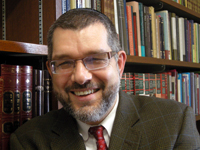This course covers the period from the partitions of Poland through the Russian and Habsburg Empires, the Soviet Union and interwar Poland. Students will familiarize with the geopolitical results of Russia’s westward and Austria’s eastward expansions and will focus among other overarching themes on the shtetl, the unique East European Jewish habitat; on Hasidism, a Ukraine-born popular movement of religious enthusiasm; on the interaction between Zionists and Ukrainian nationalists in Galicia; on the development of Ukrainization and Yiddishization (or Ukrainian and Jewish korenizatsiia) in the 1920s and the situation of Jews in Poland in the 1920s; on the Holocaust and its aftermath; on Ukrainians and Jews in the dissident movement; and on Jewish-Ukrainian...
This intensive 5-lecture mini-course (12 academic hours) takes a close look at various urban centers (sometimes the shtetl-like and sometimes the city-like) that shaped Jewish-Polish-Ukrainian cultural encounters that inspired the rising literary figures to explore East European multi-cultural urban legacy and make this legacy central in their creative writing. Students will explore various forms of East European urban culture—a shtetl (Chortkiv and Berdychiv), a provincial center (Chernivtsi and Ternopil), a city (Kyiv), a metropolis with a strong East European diaspora presence (Montreal and New York). This course will provide students with methodological tools at the intersection of the literary and cultural studies, urban studies, and social history.
This intensive 5-lecture mini-course (12 academic hours) introduces key broad themes that explore modernization and anti-modernization, urbanization and migration, secularization and acculturation and a new stratification of the Jewish society in East Europe. While it looks at the Russian empire and its western borderlands and Austrian Empire and its eastern borderlands, it focuses on Ukraine in its to-date geographical boundaries that include Galicia and Bukovina. The course does not have any prerequisites and provides broad contextualization of the selfimposed and empire-orchestrated reforms within the Jewish society against the backdrop of the Late Imperial Russia and the "long nineteenth century."


